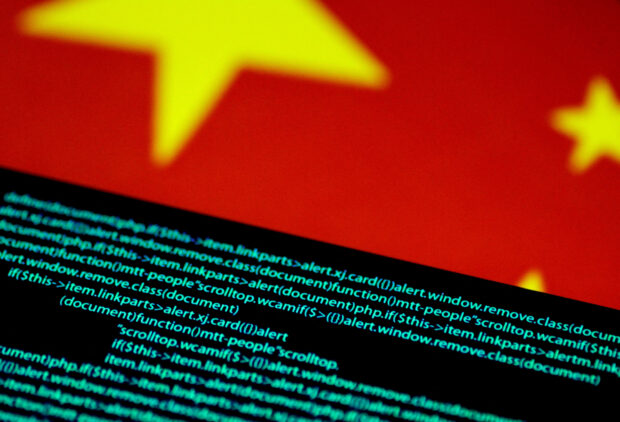US State Department warns China could hack infrastructure, including pipelines, rail systems

FILE PHOTO: Computer code is seen on a screen above a Chinese flag in this July 12, 2017 illustration photo. REUTERS/Thomas White/Illustration
The US State Department warned Thursday, May 25, that China was capable of launching cyber attacks against critical infrastructure, including oil and gas pipelines and rail systems, after researchers discovered a Chinese hacking group had been spying on such networks.
A multi-nation alert issued Wednesday revealed the Chinese cyber-espionage campaign had been aimed at military and government targets in the United States.
The Chinese government has rejected assertions that its spies are going after Western targets, calling the joint warning issued by the United States and its allies a “collective disinformation campaign.”
READ: PH, neighbors on Sino cyberhit list, says US firm
“The US intelligence community assesses that China almost certainly is capable of launching cyberattacks that could disrupt critical infrastructure services within the United States, including against oil and gas pipelines and rail systems,” State Department spokesperson Matthew Miller said in a press briefing.
“It’s vital for government and network defenders in the public to stay vigilant.”
The espionage group – dubbed “Volt Typhoon” by Microsoft – was the subject of an alert issued by cybersecurity and intelligence agencies in the United States, Britain, and their close allies.
READ: US and allies accuse China of global hacking spree
United States agencies have been pushing for improved cybersecurity practices in its majority-privately held critical infrastructure industry after the 2021 hack of the key Colonial Pipeline disrupted nearly half of the US East Coast’s fuel supply.
Microsoft researchers said Volt Typhoon was developing capabilities “that could disrupt critical communications infrastructure between the United States and Asia region during future crises” – a nod to escalating tensions between China and the United States over Taiwan and other issues.
READ: US charges seven in wide-ranging Chinese hacking effort
The group has targeted critical infrastructure organizations in the US Pacific territory of Guam, Microsoft said, adding that the security firm Fortinet’s FortiGuard devices were being abused by Volt Typhoon to break into its targets.
Researcher Marc Burnard, whose organization Secureworks has dealt with several intrusions tied to Volt Typhoon, said Secureworks had seen no evidence of destructive activity by Volt Typhoon, but that its hackers were focused on stealing information that would “shed light on US military activities”.
Chinese foreign ministry spokesperson Mao Ning told reporters that the alerts, issued by the United States, Britain, Canada, Australia, and New Zealand were intended to promote their intelligence alliance, known as the Five Eyes – and that it was Washington that was guilty of hacking.
“The United States is the empire of hacking,” Mao said.
READ: US accuses Chinese hackers of seeking to steal COVID vaccine research


















